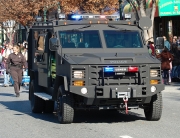In late 2013, the San Diego Jails did something unusual; they created a separate unit aimed toward rehabilitating veterans who had found themselves on the wrong side of the law.
The walls are painted patriotic colors and armed forces banners are hung throughout the common areas.
At the Vista Detention Facility, a retired marine who volunteers at the jail tells the inmates that they served their country, they are special, and he doesn't want to see them back behind bars after their sentences are up.
From there, he made them each raise their right hand and vow to stay on the straight and narrow.
The veterans-only experiment
The first veteran's unit was implemented at the San Diego Central Jail last fall. Since that time, the sheriff's department feels it's been successful enough that it was worth adding another one at the Vista Detention Facility.
The success of each unit will be evaluated by the San Diego Association of Governments (SANDAG), who will use roughly $335,000 in grant funding to track their progress.
In addition to getting separate housing, inmates have access to things like career counseling, substance abuse prevention along with stress and anger management courses.
The San Diego Sheriff's agree that yes, while these specialized programs are having an impact, a key part of the unit's success is the volunteers from places like the Escondido-based Interfaith Community Services, the Veterans Village of San Diego and the American Combat Veterans of War.
They are helping these inmates realize that they not only have self-worth, but their lives, choices and decisions also matter.
Veterans programs are on the rise
These types of programs are becoming more and more prevalent, according to sources, especially in light of the number of people who enrolled in the armed forces after 9/11.
Studies have shown that people who are discharged with PTSD are nearly 2 times as likely to be arrested for crimes than their non-PTSD counterparts. Alcohol and drug abuse are also contributing factors, they said.
San Diego County has been a leader when it comes to working with post-combat veteran offenders, and the county has even gone so far as to open a veterans court. Ultimately, it diverts non-violent and first-time offenders into treatment programs instead of tossing them behind bars.
SANDAG to closely evaluate recidivism
In San Diego, roughly 70 veterans have already "graduated" from the Veteran's Moving Foward Program, another 102 are currently enrolled.
The US Department of Veterans Affairs has also gotten involved; they've assigned a social worker to help soon-to-be-released veterans find housing, which has been strongly linked to reduced recidivism.
Other groups help provide reading glasses, money for commissary and even dress shoes and toiletries to those who are about to be released. If housing is a problem, they'll even put them up at a hotel for a few days to help give them extra time to make more permanent arrangements.
SANDAG said they look forward to tracking the results. As for the volunteer groups, they say they are there to remind the former servicemen that they survived combat, and that every day is precious.















Follow Us
Facebook
Twitter
Google +1
LinkedIn
Youtube